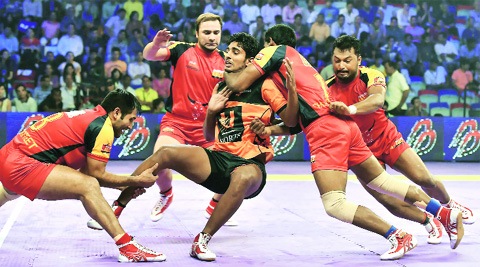Stay updated with the latest - Click here to follow us on Instagram
Kenyan import in India to raid
Pro-Kabaddi League's only African player on the game and learning Hindi.
 U Mumba player being caught by Bengaluru Bulls players during their Pro-Kabaddi match in New Delhi. (Source: PTI)
U Mumba player being caught by Bengaluru Bulls players during their Pro-Kabaddi match in New Delhi. (Source: PTI)
Dressed in a black jumper, Simon Maina Kibura displays no signs of nervousness as his team — the Puneri Paltan — takes on U Mumba at the Thyagaraj Sports Complex in New Delhi. At first glance, the Nairobi native looks like any other mean runner that Kenya continues to produce with clockwork monotony. However, the 23-year-old is in India on a “raid”. Standing at 6’1, with long legs and a wiry frame, he is the only African player in the franchise-based Pro-Kabaddi League.
So what made him choose this traditional sport, which is more popular in India and parts of South-East Asia?
“Last August, I was introduced to the sport by my friend Njoronge, who is into taekwondo and other sports in Nairobi,” Simon quips.
“Initially, I found it hard to pronounce it… Kaddiba, Kabbidga… I then realised it was a form of physical contact sport. What I like about kabaddi is that it is competitive and tests your speed, agility and endurance. It is also a very dangerous sport.”
Barely two weeks in India, Simon is impressed by the hospitality and has been able to gel with his Puneri Paltan players.”They call me bhai and being the only African player in the side does not concern me at all. I have picked up a few Hindi words like kaise ho (how are you) and khushi khushi (happy, happy).”
As a raider, Simon has the height and a long reach, which he uses to his advantage, especially in tagging opposition players. A true professional, Simon has managed to make the seamless transition from the kabaddi, which he has played and practised in the open fields of Nairobi, to the one played indoors on matted synthetic tracks and under floodlights in India. “It was a slight technical adjustment that I had to make. After a couple of days of practice, it was fine,” he says.
This is not Simon’s maiden trip to India. He was in Punjab last year representing Kenya at the kabaddi World Cup. “Playing the World Cup was a learning experience for me. We travelled through places like Bathinda, Ludhiana and Amritsar.”
The high point for Simon in the World Cup was beating Argentina in one of their league games. He believes that his performance in the World Cup along with his fitness and training was what made the owners of Puneri Paltan select him over two other compatriots who were shortlisted for the pro league.
Before foraying into kabaddi, Simon had dabbled in other sports such as athletics, boxing, discus throw and acrobatics, enjoying varying degrees of success in each of these disciplines. “I have taken part in the 400m at the national level and was also good at discus throw, acrobatics and boxing. In fact, I was selected for discus throw at the national trials in 2011. However, I failed to make the cut. There is intense competition in these sports in Kenya, much like cricket in India,” he rues.
A pioneer
A sprinter himself, Simon says Jamaican sprinter Warren Weir is someone he admires. “He is an outstanding talent. Young, fresh and just 21, he is someone to watch out for in the future.”
Going forward, Simon is confident that his foray into pro-kabaddi will help popularise the sport in Kenya. “I am confident that by next year we will see at least five African players participating in this league. But a lot will depend on how the Pro-Kabaddi League deals with players and how they facilitate them,” he argues.
Kabaddi may have taken baby steps in his native place, but Simon believes it is one in the right direction. “We have set up the Kenya Kabaddi Sports Association, comprising 60 players, all of whom are Kenyan nationals. It is very much at the nascent stage, but we are planning to popularise the sport at the grass-roots level by attracting youth, especially from universities and high-schools.”
By 2017, Simon is hopeful of replicating a similar league in Nairobi, along the lines of the Pro-Kabaddi League, albeit on a much smaller scale.
“Inshallah! if everything goes according to plan, we can set up our very own kabaddi league in three years’ time. Our target will be players in the age-group of 16-22. However, getting sponsorships and funds will be a major hurdle that we will have to overcome,” he says.







